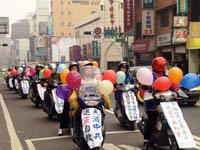Taiwan plans to mark its National Day with military parade
Taiwan will mark its National Day on Wednesday with a military parade - its first in 16 years - in an apparent attempt to show off its ability to deter or repel an attack from rival China.

President Chen Shui-bian and other leaders will inspect an array of weapon systems at a boulevard in front of the ornate presidential office building. More than 2,000 soldiers will participate in the parade, according to the Defense Ministry.
Taiwan halted military parades in the early 1990s as it sought to ease tensions with China following the self-ruled island's transformation to a democracy. Taiwan and China split amid civil war in 1949.
But Chen - who is to step down next May after eight years in power - apparently hopes to use the parade to ease public worries that the island might not win in a conflict with China.
China still claims the island a part of its territory and has repeatedly threatened the use of force to stop Taiwan's push toward formal independence.
Tensions have escalated recently over Chen's recent campaign to underscore the island's sovereignty, including a push for a referendum to back the government bid to rejoin the United Nations. The ruling Democratic Progressive Party also passed a resolution last month to emphasize Taiwan's separateness from China.
Wednesday's parade will highlight two indigenously developed missiles being unveiled for the first time.
"This is an opportunity for the public to see the latest weapons," said presidential office spokesman David Lee.
The Hsiung Feng (Brave Wind) III ship-to-ship missile is believed to be capable of attacking fuel tanks and ammunition depots on a vessel. Analysts say the missile could be used against aircraft carrier battle groups China could deploy in a war.
The Tien Kung (Sky Bow) III - an anti tactical ballistic missile - is believed to be effective in tracking and knocking down aircraft and cruise missiles.
Also on display will be warplanes, armored personnel carriers and other combat vehicles, the Defense Ministry has said.
National Day marks the 1911 revolution that toppled the Qing dynasty and established the Republic of China, the first republic in China.
Taiwan's opposition politicians have said they will not participate in official celebrations to protest what they see as Chen's readiness to dump the island's official name of the Republic of China, which connotes eventual unification of Taiwan and China.
Radical members in Chen's party have pushed to change the island's name to Taiwan.
Subscribe to Pravda.Ru Telegram channel, Facebook, RSS!


